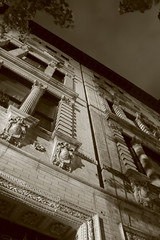 Image by ·júbilo·haku· via Flickr
Image by ·júbilo·haku· via Flickr
De Blasio Seeks Answers on Voting Snarls
By DAVID W. CHEN
Intensifying the pressure on the city’s Board of Elections, Bill de Blasio, the public advocate, is demanding a detailed accounting of the problems that plagued the primary voting on Tuesday, as well as information about how poll workers were recruited and the training materials used to prepare them.
In a letter sent to board officials on Thursday, Mr. de Blasio identified several areas of concern, including specific data about the new electronic voting machines, the level of interagency coordination, the recruitment of poll workers, and voter privacy. He said he expected answers in two weeks so that remedies could be developed before the general election on Nov. 2.
Many public officials have criticized the Board of Elections for its handling of the primary, which was marred by problems largely stemming from the electronic voting machines, which were used in New York City for the first time.
A City Council committee plans to hold a hearing on the problems on Oct. 4. But Mr. de Blasio is perhaps the most high-profile official, so far, to take concrete steps to hold the board accountable for a series of mix-ups that in some cases kept polls closed for hours and prevented voters from casting ballots.
Mr. de Blasio emphasized that he was not singling out the board, noting that many city agencies were involved. One problem, for instance, involved custodians who showed up late to unlock a polling site in a school, which delayed the opening.
Still, the request also represented the latest attempt to get a better look under the hood of the city board, which has long battled a decades-old reputation as a bastion of political patronage.
“This is not about blame; it’s about accountability, and there has to be more transparency,” Mr. de Blasio said. “What’s amazing to me is the range of the problems, and the fact that we have a very tight time frame to solve them.”
Asked about the letter, Valerie Vazquez, a board spokeswoman, said it was reviewing it.
Mr. de Blasio also sent a copy of his request to Mayor Michael R. Bloomberg. The mayor is a longtime critic of the board and has repeatedly asked it — to no avail — to submit data for inclusion in the annual Mayor’s Management Report, a tool for evaluating the performance of city agencies. The mayor has no control over the board.
Stu Loeser, a spokesman for Mr. Bloomberg, praised Mr. de Blasio’s request, noting that the mayor’s office had been pressing many of those issues for years.
In his letter, Mr. de Blasio said that his staff counted problems at more than 150 polling sites — or more than one-tenth of all the sites in the city — based on calls to his office and news accounts.
Problems included polls that opened up to three hours late (in Kew Gardens, Queens), scanners that spit out ballots and displayed error messages if the edges of the ballots were not torn off cleanly (on the Upper West Side) and a shortage of manila folders to hold the ballots to guarantee privacy (in many locations).
Mr. de Blasio asked the board to tally the number of scanners that malfunctioned, and explain why.
He asked for the number of technicians who were assigned to handle machine problems.
He sought to determine how city agencies coordinated with one another “to ensure timely access to poll sites to facilitate site setup and opening.” And he asked for details about how the board recruited poll workers and how it tried “to expand the pool of applicants beyond those provided by major political parties.”
He sought specifics on poll worker training, including the number of workers who had not completed training, and on any training manuals or testing materials “used to assess poll worker readiness after training.”



No comments:
Post a Comment